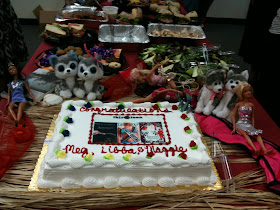Speaking of Facebook, here is a stellar example of how social media can morph into face-to-face interaction. I swung this invite because of a connection I made on Twitter--an individual who then put my name forward to the woman organizing the event, who was looking for Boston based YA book bloggers. I had never met my Twitter connection, nor the individual who eventually invited me (via Facebook I might add,) but I was more than happy to go and say thank you when we all met, for the first time, on Friday. So if you take grief about your addiction to social media, just remember this--it does pay off. And sometimes, there is even cake involved!
Self-righteous, defensive rant over--back to the main event.
I cannot say enough nice things about Mses. Cabot, Bray, and Stiefvater. Getting back to all that stuff I said about social networking; there's a reason why I find it so appealing--I'm shy. Well, these ladies put me (and everyone else, too, I assume) at ease. They were approachable and--in the case of Meg Cabot, who zeroed in with an outstretched hand and firm handshake--fast-approaching. Those ladies worked the room with charm. If I've learned anything from my recent lunches with authors (wow--it felt good to type that!) it's that an author's job doesn't end once the book is finished. The amount of meeting and greeting that is involved is amazing, and they have to be just as good at the people skills as well as the writing craft.
 |
| So many books, only so many pens |
 After lunch, but before cake, there was the book signing. I had a teeny stack, but there were book sellers there with BOXES of books. The ladies no doubt worked off lunch just by signing them all. Still, I'm sure it's a gratifying task all the same, imagining the excited hands to which those autographed books will be delivered. I know at least one ten year old girl who was beside herself when Mummy brought her an autographed copy of Allie Finkle: Moving Day. And please allow me a fan girl moment to post this:
After lunch, but before cake, there was the book signing. I had a teeny stack, but there were book sellers there with BOXES of books. The ladies no doubt worked off lunch just by signing them all. Still, I'm sure it's a gratifying task all the same, imagining the excited hands to which those autographed books will be delivered. I know at least one ten year old girl who was beside herself when Mummy brought her an autographed copy of Allie Finkle: Moving Day. And please allow me a fan girl moment to post this:Lunch, books, and schmoozing finished, the grand finale was, indeed, the cake. Decorated with the jacket covers of each of the ladies' most recent book, enhanced with toys to represent key moments from each, and boasting a most delicious frosting (I think it was Cool Whip,) the honored authors graced us all with one final photo call.
They then proceeded to cut the cake. With relish.
Best of all--they served us the cake. Authors truly are versatile.
A big thank you to the folks at Scholastic and NEIBA for a slap-up lunch, fantastic bookish discourse, and a chance to hob-nob with some truly outstanding writers who just happen to be outstanding--and very fun--women, too.






